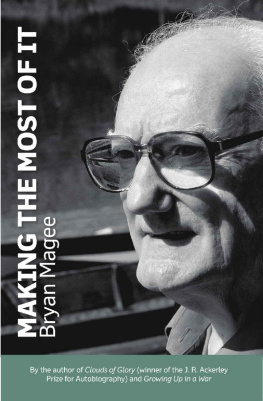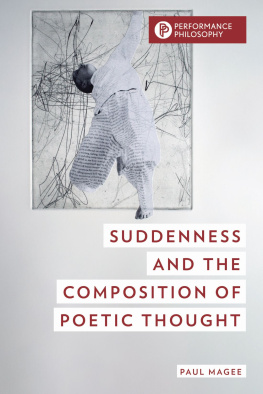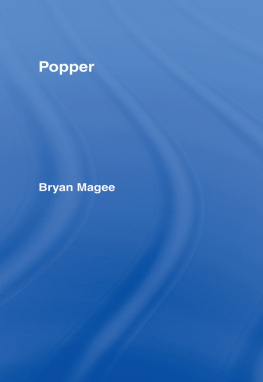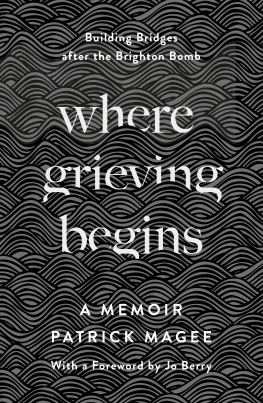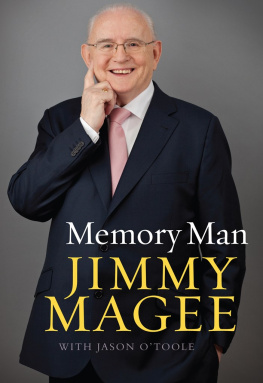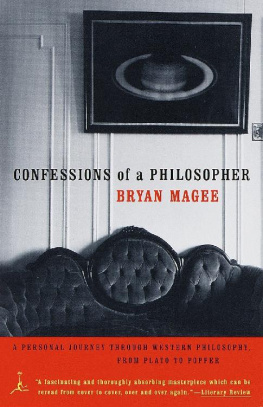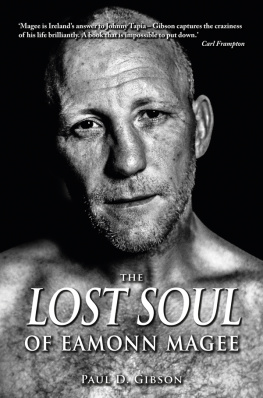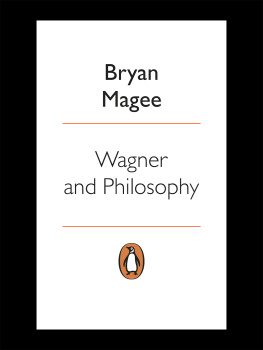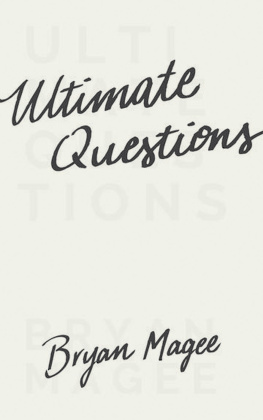Bryan Magee [Magee - Making the Most of It
Here you can read online Bryan Magee [Magee - Making the Most of It full text of the book (entire story) in english for free. Download pdf and epub, get meaning, cover and reviews about this ebook. year: 2018, publisher: CB Creative, genre: Politics. Description of the work, (preface) as well as reviews are available. Best literature library LitArk.com created for fans of good reading and offers a wide selection of genres:
Romance novel
Science fiction
Adventure
Detective
Science
History
Home and family
Prose
Art
Politics
Computer
Non-fiction
Religion
Business
Children
Humor
Choose a favorite category and find really read worthwhile books. Enjoy immersion in the world of imagination, feel the emotions of the characters or learn something new for yourself, make an fascinating discovery.
- Book:Making the Most of It
- Author:
- Publisher:CB Creative
- Genre:
- Year:2018
- Rating:3 / 5
- Favourites:Add to favourites
- Your mark:
- 60
- 1
- 2
- 3
- 4
- 5
Making the Most of It: summary, description and annotation
We offer to read an annotation, description, summary or preface (depends on what the author of the book "Making the Most of It" wrote himself). If you haven't found the necessary information about the book — write in the comments, we will try to find it.
Bryan Magee [Magee: author's other books
Who wrote Making the Most of It? Find out the surname, the name of the author of the book and a list of all author's works by series.
Making the Most of It — read online for free the complete book (whole text) full work
Below is the text of the book, divided by pages. System saving the place of the last page read, allows you to conveniently read the book "Making the Most of It" online for free, without having to search again every time where you left off. Put a bookmark, and you can go to the page where you finished reading at any time.
Font size:
Interval:
Bookmark:
making the most of it
Also by Bryan Magee
Crucifixion and Other Poems
Go West, Young Man
To Live in Danger
The New Radicalism
The Democratic Revolution
Towards 2000: The World We Make
Aspects of Wagner
One in Twenty: A Study of Homosexuality in Men and Women
The Television Interviewer
Modern British Philosophy
Popper
Facing Death: A Novel
Men of Ideas: Some Creators of Contemporary Philosophy
(later Talking Philosophy: Dialogues with Fifteen Leading Philosophers )
On Blindness: Letters between Bryan Magee and Martin Milligan
(later Sight Unseen )
The Philosophy of Schopenhauer
Confessions of a Philosopher
The Story of Philosophy: The Essential Guide to the History of Western Philosophy
The Great Philosophers: An Introduction to Western Philosophy
Wagner and Philosophy
Clouds of Glory: A Hoxton Childhood
Growing up in a War
Ultimate Questions
making the most of it
Bryan Magee
Bryan Magee 2018
The right of Bryan Magee to be identified as the author of this work has been asserted in accordance with the Copyright, Designs and Patents Act 1988
A CIP catalogue record for this book is available from the British Library
Independently published by Studio 28
ISBN 9781980636137
Please visit
www.curtisbrown.co.uk/bryan-magee
for further information
Contents
Book One: My Oxford
1 Overview
2 Caroline
3 The Oxford Union
4 Friends
5 Writers
6 Colleges
7 Vacations
8 My Last Year
9 Going Down
Book Two: The Turning Point
Book Three:
My Second Go at Life
1 Guinness is Good for You
2 Running for Parliament
3 Young Man in London
4 Starting in Television
5 Cutting Free
6 Becoming a Member
of Parliament
7 About the House
8 My Forties
9 Becoming a Full-Time Author
Book One
My Oxford
to
Robin Burke, Robin Schur
and Robin Hallsmith
with love
to you all
Overview
The Oxford I went up to in 1949 was different from its normal self. During the Second World War, 1939-45, young men of university age were nearly all in the armed services; and most of those were not released immediately when the war ended. British forces continued to occupy Germany and Austria for several years, and were committed in other parts of the world too, so compulsory call-up at eighteen continued well into the 1950s. Meanwhile the post-war Labour Government, having made full employment its priority, was careful not to flood the labour market by demobilizing too many servicemen at any one time. So the release of those who had fought in the war was phased out over a couple of years. The first to be let go were older men with families, and those who had jobs waiting for them, or skills that were in demand. Younger men without any of these, having also served less time than the older ones, were made to wait.
So for some years after the war, Oxford was taking in ex-servicemen who could be any age up to about twenty-four when they arrived. This meant that undergraduates in their third or fourth years could be twenty-seven or twenty-eight. The President of the Union in my first summer term, Robin Day, was twenty-six, and had been in the army in Africa during the war. This was typical. Most students had served overseas, and many had seen actual fighting. So they were exceptionally mature to be students. The whole atmosphere of the university was transformed by them. Many of the time-honoured rules and regulations, such as students not being allowed to go into pubs, collapsed for ever. Their relationships with their tutors were close to being on an equal footing one or two of the third-year men were older than their tutors. Everything became more open and free, and it was a strangely optimistic time. The war, after years of struggle, and millions of dead on both sides, had been won. The undergraduates felt they were survivors, and wanted to build a new life for themselves in a world which they hoped to make a better one. There was a grown-up idealism among them, not the callow idealism of youth but one edged with practicality, and charged by experience of war.
Because the university needed to find places for students of so many different ages it was not able to offer them to boys straight out of school. Girls were in a different situation. There being no call-up for them, they went straight from school to university. Boys, however, even though the war was over, had to join the armed forces at eighteen and do up to two years of military service. Only in special circumstances would colleges take them otherwise. And this was the position I found myself in, typical of my student generation: I had won an open scholarship from school to Oxford, but my college would not accept me until after I had completed military service.
I have told elsewhere (in Growing Up In A War ) how, when I joined the army, I was sent unexpectedly into the Intelligence Corps. They trained me at the School of Military Intelligence, and sent me to Austrias frontier with Slovenia, which was then part of Yugoslavia. My job was to interrogate illegal frontier-crossers, some of whom were Yugoslav secret agents. For an eighteen-year-old it was heady stuff. In my late twenties I wrote a novel set in that world, called To Live In Danger . Its background is entirely authentic, though its plot and characters are fictitious. When I was nineteen I was shifted to my local headquarters in Graz (the second city in Austria after Vienna) to interrogate newly returned Austrian prisoners of war from Soviet Russia. A huge number of Germans and Austrians were still being held there, more than four years after the war had ended. I found the work fascinating and my out-of-hours life was almost as colourful and interesting. I had a girlfriend to whom I was devoted. My social life with colleagues of my own age was more uninhibited than it would have been in England. We were under the command of older men, but they allowed us an amazing degree of latitude, socially as well as professionally. So long as we did our jobs well, and did not cause them embarrassment otherwise, they did not care what we did. So we lived with great personal freedom. And then, of course, there were the attractions of Graz itself. Of particular interest to me was its opera house, which I went to frequently. (I saw my first Tannhuser there, and my second Tristan ). I spent my leaves in Vienna, whose opera company was then going through a golden age which remains a legend even today, and which I visited almost every night regardless of what they were performing.
It was from this life that I went up to Oxford as an undergraduate. There was something known as a Class B Release that soldiers with places earmarked for them at universities applied for: if you got one, it meant you left the army early to catch the beginning of an academic year instead of having to be demobilized in mid-year and then hang around for several months. I got one of these, as did most of my colleagues, and that meant that from my first day at Oxford I had friends in several colleges. (The University of Oxford is a federation of many self-governing colleges more than two dozen then, more than three dozen now.) One acquaintance, a music-lover working with the Intelligence Corps in Vienna, enjoyed his life there so much, gorging on opera at a level of performance not to be found anywhere else at that time, that he deliberately did not apply for a Class B Release, and spent a whole extra year there before joining us in Oxford. None of the rest of us to my surprise, now that I look back on it thought of doing that.
For many of us, Oxford was a let-down at first. It was so much less exciting than the life we had left in order to go there. No doubt our expectations were unrealistic. Mine certainly were. I had imagined Oxford to be full of people who were passionately interested in ideas, perhaps especially political ideas; and also in the arts, especially literature. I had expected to find myself surrounded by such people, either arguing formidably or chattering amusingly into the small hours night after night, floating down rivers of wonderful talk. I had, in other words, imbibed the romantic image of Oxford peddled in novels, plays and films, and perhaps been encouraged in it by one or two personal acquaintances. The reality was otherwise. Most people at Oxford were not particularly interested in ideas, nor in politics; nor did they have any particular interest in the arts. This was as true of the dons as it was of the undergraduates. There were plenty of parties, though, and for a freshman these were the most enjoyable thing that Oxford had to offer. But I cannot say that the conversations at them were special: drink and girls were what parties were chiefly about. I took as much advantage as I could of both, and derived a lot of enjoyment from them. But my life as a whole was not what I had expected Oxford to be.
Next pageFont size:
Interval:
Bookmark:
Similar books «Making the Most of It»
Look at similar books to Making the Most of It. We have selected literature similar in name and meaning in the hope of providing readers with more options to find new, interesting, not yet read works.
Discussion, reviews of the book Making the Most of It and just readers' own opinions. Leave your comments, write what you think about the work, its meaning or the main characters. Specify what exactly you liked and what you didn't like, and why you think so.

